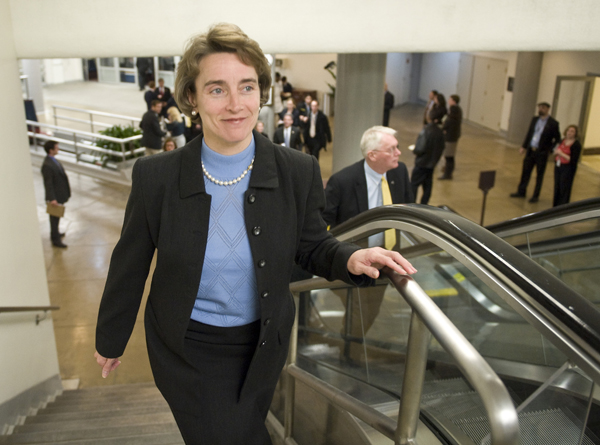A number of key senators returned to the Capitol after election Tuesday with good news for Wall Street foes. By defeating her primary challenger, Lt. Gov. Bill Halter, Sen. Blanche Lincoln (D-AR) has strengthened her hand in the final financial reform negotiations, and has given new life to a much-debated provision, which would require financial firms to spin off their derivatives trading desks. But the measure still faces broad and stiff opposition from powerful interest groups and the Obama administration, and there’s little if any evidence that Lincoln’s victory weakened their resolve to, at the very least, scale it back.
“She returns as the chairman of the Agriculture Committee, running for re-election in November, which I think gives her a strong bargaining position,” Senate Majority Whip Dick Durbin told reporters yesterday.
The reasoning is simple: Facing a tough re-election challenge in November, Democrats will be loath to publicly undercut her, particularly given how great a role her contributions to Wall Street reform played in the Arkansas primary.
Sen. Tom Harkin (D-IA), a member of the conference committee, echoed Durbin after a meeting yesterday and said progressives might bolt if it’s “tinkered with.”
Even Tennessee Republican Bob Corker said Lincoln’s victory “has to have an impact of some kind.”
“It makes it…more interesting to deal with,” Corker told reporters coyly yesterday afternoon.
But Durbin and Harkin are stalwart supporters of the Lincoln proposal, and Corker has long been cynical about the Democrats’ political motives as they’ve advanced the Wall Street reform bill.
By contrast, Senate Banking Committee Chairman Chris Dodd, a consistent skeptic of the spin-off plan, and the Senate’s principal financial reform negotiator took a different view. He described Lincoln’s plan as “on the right track” but disagreed with his colleagues that her victory alters the chances that it will be changed.
Sen. Barney Frank (D-MA), who chairs the conference committee, has also said he thinks Lincoln’s plan is unnecessary–but he’ll have to balance his skepticism against House Speaker Nancy Pelosi’s support of it.
Public deliberations over the final bill begin this afternoon, and, perhaps weighing in Lincoln’s favor, any attempt to change her plan will have to be voted on publicly.










